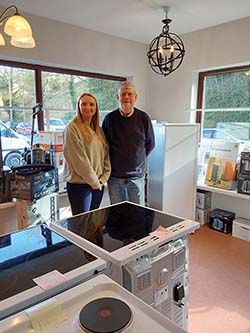
Harrison and Cross Electrical Contractors

In the age of internet shopping there is still a place for the local specialist family business as demonstrated by the success of the Settle-based electrical contractors Harrison and Cross, who this year mark the 25th anniversary of the opening of their showroom in the Sidings, next to the town’s station.
Clapham-born Graham Cross, who now lives in Langcliffe, set up his electrical contracting business with Brian Harrison in the 1970s. Brian, who was much older than Graham, died many years ago, but the business still bears his name.
After working from a garage for many years, the company bought a plot of land in the sidings for £10,000 in 1988. At that time the threat of closure hung over the railway and the original rail sidings had been demolished. After the railway was saved, English Estates tried to buy back the land, but by then Harrison and Cross had spent a further £40,000 on constructing their workshop and the sellers were not prepared to meet the extra costs of repurchasing.
The opening of the showroom in 1999 marked a big change for the company. It meant goods were on hand for customers to see and that off-set the considerable investment of buying stock in the hope of future sales.
Harrison and Cross now employ five electricians, led by Graham’s son Andrew, whose wife Abigail (pictured with Graham, below) is one of two office workers.

At 71, Graham regards himself as more or less retired but still takes a very keen interest in the company, both its past and its future.
As to why a business like his can compete with the internet giants, Graham explains that whilst the on-line companies may be able to beat local firms for price what they cannot offer is the sort of flexibility you get with businesses like his.
For instance, the day we met he had been out around 8am visiting a customer to measure up for an appliance that could be viewed in the showroom and would be installed at a time when the buyer was back from work.
That is the sort of service that will suit those who go out to work, but it is mainly the elderly who value the opportunity to see a cooker or fridge before purchasing and need professional installation along with instructions that go beyond those found in a multilingual manual.
But changing times have also brought their challenges. Harrison and Cross no longer sell televisions. The cost of installation outweighs any profit to be made.
Despite the current enthusiasm for recycling, long gone are the days when appliances, including televisions, could be brought into the workshop for repair before being returned to the customer.
You can now buy a washing machine for the same price as you could when the showroom opened in 1999. But you would only expect it to last four or five years before needing to replace it. Taking away old and broken products has its problems too as the cost of taking scrap to a depot effectively outweighs any income received for the scrap.
There have been specific challenges too over the past quarter of a century. The showroom had not been open long when foot and mouth effectively closed down this area and made supplying local farms, a big part of the business, impossible for months. However, there was an upside, the post disease deep clean that had to be undertaken by all farms, meant the reinstallation of much electrical equipment.
The financial crisis of 2009 also had an adverse effect, though perhaps not as much in areas with fewer comfortably off residents who could afford to replace electrical goods without having to dip too deep into overstretched budgets.
Most recently the covid years brought their challenges, initially with complete closure and use of the government furlough scheme, and then, as it became clearer that construction work was still allowed, a reluctance on the part of householders to have strangers in their homes.
Perhaps the biggest change that Graham has noticed is in the area’s social mix.
When he started there were more young families in the town. Now his business finds it hard to recruit young electricians. He says young families cannot afford to buy a home in the town and have to commute from places like Barnoldswick, where it is still possible to buy a home for around £100,000.
Here he sees the housing market is dominated by retirees, second homeowners and buy-to-lets for the holiday trade. He recognises that all have their part to play in a tourist economy that is also heavily reliant on older volunteers. But it is a big concern for the future workforce of businesses like his.
It is also a much bigger problem for the local service, to which he has dedicated much of his adult life – as a retained firefighter. The fire service relies on young fit volunteers. The council facility at Langcliffe and the paper mill were once a source of such people, but both have closed.
When he was involved before retiring in his 50s, the force was 15 members strong, now it is having to recruit to build on the handful who do this essential job. The sort of call outs have changed too. It used to be domestic blazes, especially chip pan fires, and barn fires that could take days to extinguish. Now it is more road traffic accidents, especially those involving motorcycles.
Times have changed both for the fire service and the electrical contracting business. But having faced major challenges over the past quarter of a century Graham remains reasonably optimistic for the future of local business and the essential services that the town needs.
If you run a local business and would like to be featured here, please get in touch



